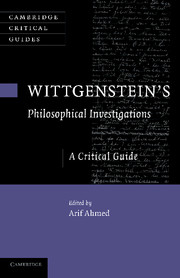Book contents
- Frontmatter
- Contents
- List of contributors
- Acknowledgments
- Introduction
- 1 From referentialism to human action: the Augustinian theory of language
- 2 What's doing? Activity, naming and Wittgenstein's response to Augustine
- 3 Measure for measure? Wittgenstein on language-game criteria and the Paris standard metre bar
- 4 Wittgenstein on family resemblance concepts
- 5 Wittgenstein on concepts
- 6 Wittgenstein vs contextualism
- 7 Wittgenstein and the linguistic turn
- 8 Rorty's Wittgenstein
- 9 Are meaning, understanding, etc. definite states?
- 10 Another strand in the private language argument
- 11 Deductive inference and aspect perception
- 12 Remembering intentions
- Bibliography
- Index
5 - Wittgenstein on concepts
Published online by Cambridge University Press: 06 July 2010
- Frontmatter
- Contents
- List of contributors
- Acknowledgments
- Introduction
- 1 From referentialism to human action: the Augustinian theory of language
- 2 What's doing? Activity, naming and Wittgenstein's response to Augustine
- 3 Measure for measure? Wittgenstein on language-game criteria and the Paris standard metre bar
- 4 Wittgenstein on family resemblance concepts
- 5 Wittgenstein on concepts
- 6 Wittgenstein vs contextualism
- 7 Wittgenstein and the linguistic turn
- 8 Rorty's Wittgenstein
- 9 Are meaning, understanding, etc. definite states?
- 10 Another strand in the private language argument
- 11 Deductive inference and aspect perception
- 12 Remembering intentions
- Bibliography
- Index
Summary
There is a long list of titles of the form ‘Wittgenstein on X’. There is a somewhat less long list of cases in which the X is replaced by an unexpected noun. My title falls into that second category, though not squarely. I shall explain why in the first section, where I expound the exegetical importance of my topic and list claims about concepts that can be found in Wittgenstein's later work. Section 2 indicates why the topic is also significant from a substantive perspective. It distinguishes five urgent philosophical questions about concepts – the definition question, the possession question, the priority question, the individuation question and the function question – and introduces Wittgenstein's answers. The next two sections approvingly discuss two of these answers – namely that a philosophical account of what concepts are ought to start with an exploration of concept-possession (section 3) and that the latter is a special kind of ability (section 4). Section 5 rejects the Wittgensteinian proposal that concepts can be equated with abilities and section 6 does the same with Wittgenstein's own suggestion that they can be equated with techniques or rules. The final section turns to the individuation question. While concepts cannot be equated with word-meanings, they are individuated along the same lines. An adequate criterion for the identity of concepts emerges through combining Frege's idea of cognitive equivalence with Wittgenstein's idea that meaning is determined by explanation.
Keywords
- Type
- Chapter
- Information
- Wittgenstein's Philosophical InvestigationsA Critical Guide, pp. 88 - 108Publisher: Cambridge University PressPrint publication year: 2010
- 9
- Cited by

